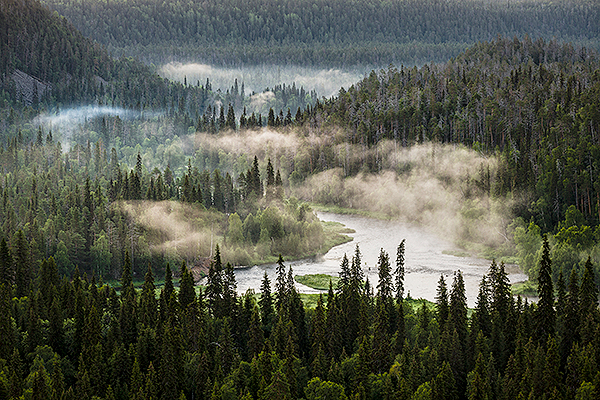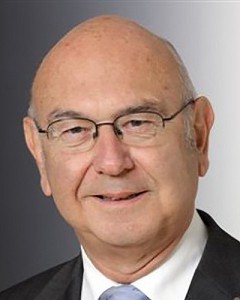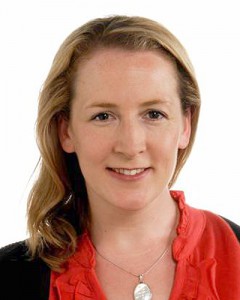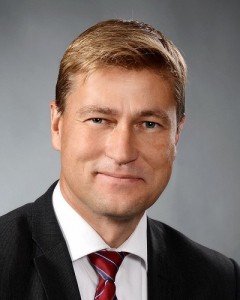
The pristine wilderness area around Ruka in northern Finland makes it the perfect location to host an economic forum on the bioeconomy. In less than 40 years Finland has doubled its forest growth and is today at a level of 100 million m3 of growth per year of which only 60% is utilised. This is why the nation has become a “hot spot” for the new, large and highly efficient biorefineries that are transforming the bioproducts industry into a new force in an exciting industry.
Jukka Kantola is one of Europe’s bioeconomy pioneers, and the prime instigator behind the Ruka World Bioeconomy Forum. After working in the pulp and paper industry in Europe and Asia for number of years, he realised that Finland could to get significantly more out of its abundant wood resources, and consequently founded a consulting service company fully focused on the bioeconomy together with Tuomo Niemi of Poyry background and Professor Olli Dahl of Aalto University. This company now operates under the name NC Partnering. The team of partners later grew to include Antti Kivimaa, Martin Doktar and Esko Nenola, and a network is continuously built of associated partners, bioeconomy related companies and institutes, thus enabling NC Partnering to providing up-to-date services for a wide range of bioeconomy challenges. Since 2016, NC Partnering has been in charge of KaiCell Fibers in Paltamo, north-east Finland.
The World BioEconomy Forum is gathering major influential speakers and panelists in Ruka to share their views on evolvement of bioecomomy. The exotic location will provide inspirational spirit for the event.
Mark Rushton, forest products media consultant, has joined the World BioEconomy Forum as overall moderator of the event, and is interviewing some of the key speakers and panellists. These interviews will be published later on in www.wcbef.com.
Three key questions with speakers and panelists who will be on stage in Ruka.
Tell us about your vison for the Bioeconomy

For me the bioeconomy of tomorrow will be one that will have as many bio-based production and service lines that are economically reasonable and feasible and that there is a strong sustainable use of biological resources, including animals, microorganisms, plants and insects. This cannot be done without industry because this is not an environmental movement, it is a bioeconomy. To make this successful, we need new ways of cooperation within agreed frameworks which are regional, local and international, with permanent openness starting as research initiatives and ending up as many bio-based products and services.
In your opinion, how are we going to get there?
We need a little more patience and tolerance, this won’t even happen from one decade to another, it will be a long journey. it is already a big a surprise to me how far we have come in just 12 years, with the European element in a strategy, originally meant just to be a RTDI Initiative for a research and knowledge based bioeconomy. Now there are 50 countries and regions all over the world that have their own strategies and road maps on the bioeconomy. This is great news!
Secondly there is growing awareness that with a more stringent use of biological resources is essential, which means a strong and stringent bieconomic element, the bio sector sector can make a huge contribution to solving big problems for the future.
How will the event in Ruka help with your vision and strategy for the future of the Bioeconomy?
Well, first of all the idea of meeting style like Davos is a great idea. We need to have global platforms to share views, and change views, to learn mutually about practices, good and bad. We also need to develop a corporate identity for the Bioeconomy, this is very important because other big communities have a clear identity and profile; for example the Sustainability Community, or the Climate Change community, they are much better organised and this is missing. Ruka will be the perfect place to create an informal infrastructure where we can meet and exchange views, but also really deliver a solution for a bioeconomic vision.
Tell us about your vision for the Bioeconomy

The bioeconomy that we are developing, enabled by industrial biotech, will be critical to delivering solutions to the UN Sustainable Development Goals. By innovating in this area we will make better use of the land and resources available to us to produce renewable products and processes. In doing so we’ll see a broad range of sectors, including chemicals, materials, pharmaceuticals, plastics, food and feed ingredients, detergents, pulp and paper, textiles and bioenergy, become more competitive whilst creating jobs and adding revenue to the EU economy.
In your opinion, how are we going to get there?
We need to continue investing in cutting edge research and innovation through Horizon Europe funding, including a second mandate for the BBI Joint Undertaking, whilst also seeking out other ways that we can combine funding in this area. The recent EIB announcement on funding for the bioeconomy is another good example of this and we should also seek to channel funding from structural funds and the common agricultural policy towards the bioeconomy. It’s important that we also maximise synergies between the bioeconomy and the circular economy and that we continue to raise awareness of the benefits of bio-based products. We would like to see more creative thinking on ways to stimulate new markets for renewable bio-based products as part of the process of divesting from fossil carbon markets. We also need to make sure that the benefits of developing the bioeconomy are evident in every link of the value chain from primary production, through to consumer brands through to recycling and reuse at end of life.
How will the event in Ruka help with your vision and strategy for the future of the Bioeconomy?
These discussions can’t be exclusively industry led or driven – we need to involve all stakeholders in the dialogue around the development of a smarter more sustainable bioeconomy and to learn, wherever possible, from best practices. The World BioEconomy Forum will be very influential in this respect and we are very much looking forward to learning more there and to taking part.
Tell us about your vision for the Bioeconomy

For ANDRITZ, sustainability is a decisive factor in securing long-term success and securing the development of Bioeconomy is an integral part of that. From pulp and paper production as well as energy generation point of view, we want to see new technologies and wood/bio based products of high value being developed and find their way to the everyday life of people. Wood based products are important tools in the fight against plastic pollution and climate change (renewable, raw material captures CO2 while growing, recyclability, biodegradable etc) In many cases, use of these products also helps to build up a stable infrastructure, promote sustainable industrialization, and also to drive innovations.
In addition, there are many ways of getting even more out of the existing systems by improving the current pulping, papermaking and energy generation processes contributing to the economical, environmental and social benefits of us all. The goal is to minimize the use of such resources as energy and raw materials in a sustainable way, but also to optimize production at the same time. A well managed Bioeconomy platform will help us to also to reach the targets of Circular economy, meaning 100% utilization of all side streams in pulp and paper mills.
In your opinion, how are we going to get there?
In order to reach these targets ANDRITZ among the leading global suppliers in all of its business areas, needs to continue investing in the development of the new technologies and together with our clients implement these into the overall concepts of the clients’ production facilities. The ultimate goal is to offer customers cutting-edge technologies that help them to achieve their Bioeconomy objectives in terms of productivity, quality, resource and energy efficiency, as well as sustainability.
These include for example:
- Technologies for producing as much papermaking fiber as possible out of the raw-material in use (A-yield concept)
- Recovering and further processing of bioproducts such as lignin, methanol as well as sulfuric acid (A-Recovery + concept, ) tall oil, turpentine, etc from the side streams of pulp mills
- Modifying cellulosic fiber for new applications such as for pharmaceutical use or as beneficial constituent in animal feed as Microcrystalline cellulose (AaltoCell – MCC concept)
- Manufacturing of dissolving pulp for textile industry or other applications
- Energy generation for sales to the national grid based on energy efficient solutions and HERB recovery boilers
In addition to the process technologies, we are researching and pursuing intensely artificial intelligence, self-learning systems and augmented reality applications, which will soon become the standard approach, in maintenance for example. This is where ANDRITZ’s thoroughly tried-and-tested digital solution Metris OPP steps in.
How will the event in Ruka help with your vision and strategy for the future of the Bioeconomy?
Events like Ruka are excellent meeting places for decision makers and technology providers for sharing information on targets and possibilities within the bioeconomy. During the last decade the bioeconomy has been in the focus point and several new technologies have been developed. (The Metsä Fibre mill in Äänekoski which went into operation in 2017 is a good example of technological concept supporting the bioeconomy with its bio-product mill approach and a particularly sustainable design).
In lab scale it has been possible to show that almost all oil-based products can be made from wood. Now it is time to put those processes into industrial scale production. It is for example possible to produce traffic fuels out of residuals from pulping processes (tall oil, MeOH, lignin etc) – the big question has been the feasibility and up to now this has largely been dependent on the oil price. Regulations in different countries naturally also affect how much bio-based fuel has to be in the normal traffic fuels etc. Same logic applies to all bio-based energy.
So, in short, we are looking forward to good and open discussions during the event on the possibilities of the Bioeconomy and what Andritz can offer in order to achieve the targets.
Source
NC Partnering Newsletter, 2018-05.
Supplier
Aalto University
ANDRITZ, Inc.
Bio-based Industries (BBI) Joint Undertaking
EuropaBio
European Commission
KaiCell Fibers Ltd.
Metsä Fibre
NC Partnering Ltd
Share
Renewable Carbon News – Daily Newsletter
Subscribe to our daily email newsletter – the world's leading newsletter on renewable materials and chemicals










